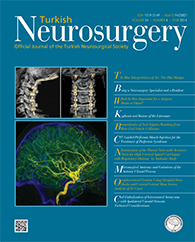2Duzce University, School of Medicine, Department of Neurosurgery, Duzce, Turkey
3Istanbul Cerrahi Hospital, Neurosurgery Clinic, Istanbul, Turkey
4Duzce University, School of Medicine, Department of Pathology, Duzce, Turkey DOI : 10.5137/1019-5149.JTN.9006-13.1 AIM: The formation of epidural fibrosis adjacent to the dura mater after posterior spinal surgery is a normal reaction of the body to surgery. Extensive epidural fibrosis is one of the important causes of postlaminectomy syndrome. Etanercept inhibits tumor necrosis factor-alpha and decreases fibroblast migration. Thus, etanercept prevents the formation of fibrosis. The aim of this study was to investigate the effects of topical application of etanercept on epidural fibrosis after laminectomy in a rat model.
MATERIAL and METHODS: Twenty-four Wistar rats were equally and randomly divided into three groups (control, spongostan and etanercept). Laminectomy was performed between L3 and L5 in all the rats. Spongostan soaked with saline (0.1 mg/kg) and etanercept (300 μg/kg) was directly exposed to and left on the dura mater. Four weeks later, the vertebral columns of the rats were removed en bloc between T10 and L5, and epidural fibrosis and arachnoidal involvement were evaluated and graded histopathologically.
RESULTS: Our data revealed that epidural fibrosis was reduced significantly in the rats treated with etanercept, compared to the control groups (p<0.05).
CONCLUSION: Our study demonstrated that topical application of etanercept can be effective in reducing epidural fibrosis in rats after laminectomy.
Keywords : Epidural fibrosis, Etanercept, Failed back surgery, Fibroblast, Laminectomy, Post-laminectomy syndrome, Rat




